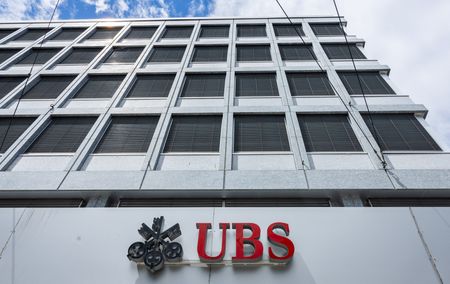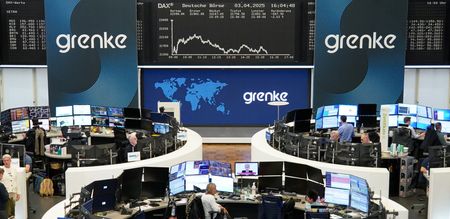By Ariane Luthi
(Reuters) -UBS on Wednesday posted better than expected first-quarter net profit, but the Swiss bank warned of an uncertain outlook as U.S. tariffs raise global growth fears even as the market tumult drove up earnings in its trading activity.
Switzerland’s biggest bank reported net profit attributable to shareholders of $1.7 billion in the first quarter of 2025, down from $1.8 billion a year earlier, but beating an average estimate of $1.3 billion in a company-provided poll of analysts.
In its investment banking division, global markets enjoyed a record quarter with revenues up 32% year-on-year, underpinned by higher client activity in equities and foreign exchange, UBS said.
Shares were up over 2% in early trading.
The outlook was more muted, however, as the backdrop of U.S. President Donald Trump’s sweeping tariffs raised uncertainty. “The prospect of higher tariffs on global trade presents a material risk to global growth and inflation, clouding the interest rate outlook,” UBS said.
UBS expected net interest income in its global wealth management business to decline sequentially by a low-single-digit percentage in the second quarter of 2025 and anticipated a similar decline in its Swiss business.
Continued market uncertainty could delay corporate deals, the bank added.
“With a wide range of possible outcomes, the economic path forward is particularly unpredictable,” UBS said, adding that a likely further period of volatility in markets could prompt investors to put off decisions on strategy and capital allocation.
Trump’s global trade war has sown turmoil in financial markets and raised fears of a recession, threatening to upend a range of industries from manufacturing to retail to banking.
HSBC on Tuesday raised the spectre of lower loan demand and an erosion in credit quality due to the broader tariff fallout, while executives at big U.S. banks warned of economic turbulence during recent earnings. REGULATORY PRESSURE
UBS on Wednesday reconfirmed its share repurchase program for 2025, saying it had bought back $0.5 billion in shares in the first quarter and reserved another $2.5 billion for the remainder of the year, despite the uncertain outlook.
The market turmoil comes on top of plans by Swiss authorities to make UBS hold more capital, which have weighed on the bank’s shares, with government proposals for a banking regulation overhaul expected in June.
Authorities have pledged to draw up stricter banking regulations to prevent a repeat of the meltdown of Credit Suisse in 2023, which was acquired by UBS in an emergency takeover.
“We believe regulatory uncertainty is the main reason for the massive underperformance of UBS shares over the last 12 months vs global peers,” Vontobel analyst Andreas Venditti said in a note.
UBS’s shares rallied over 80% from before the Credit Suisse merger to reach a high point in January, but have since underperformed peers as investors sold its stock after CEO Sergio Ermotti warned about the negative impact of new Swiss capital rules.
Integration of Credit Suisse’s business remained on track, UBS said, adding it had delivered further $0.9 billion in exit rate gross cost savings and brought cumulative cost reductions to $8.4 billion, achieving 65% of the targeted cuts of $13 billion.
UBS reduced its workforce by almost 2,000 full-time equivalents in the first quarter, the results showed, taking the total to just under 107,000 full-time equivalents by the end of March.
(Reporting by Ariane LuthiEditing by Shri Navaratnam)











